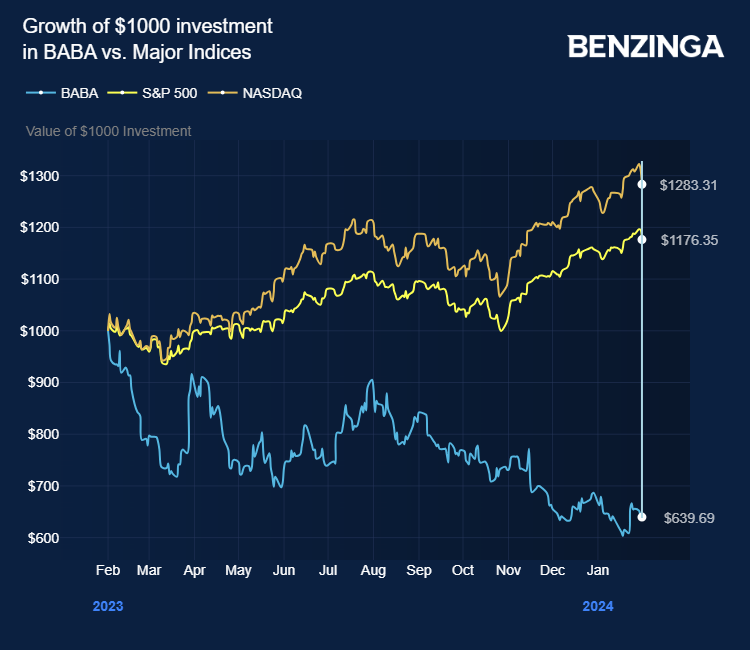Zinger Key Points
- Alibaba leads rebound in Hong Kong stocks amid Fed's policy easing optimism & boost from China's manufacturing growth.
- Alibaba eyes sale of InTime, pivots from physical-digital retail blend amid restructuring & leadership changes.
- Feel unsure about the market’s next move? Copy trade alerts from Matt Maley—a Wall Street veteran who consistently finds profits in volatile markets. Claim your 7-day free trial now.
Alibaba Group Holding Limited BABA led a rebound in Hong Kong stocks and ended a two-day decline, as the Federal Reserve’s openness to policy easing sparked optimism among traders who postponed their betting to May.
This positive shift in sentiment got a further boost from a private survey indicating that China’s manufacturing industry expanded for a third consecutive month in January. The broader market reflected this optimism, SCMP reports.
E-commerce companies and tech firms, including JD.com Inc JD, Meituan MPNGF MPNGY, NetEase Inc NTES, and Tencent Holding Ltd TCEHY, also recorded notable gains alongside Alibaba, contributing to the market’s overall positive performance.
Additionally, sectors outside of technology, such as the Chinese hotpot restaurant chain Haidilao and sportswear manufacturer Li Ning, saw substantial increases in their stock prices.
China is already weighing a stimulus package of $278 billion (2 trillion yuan) to drive the stock market.
Also Read: Tencent CEO Pony Ma Shifts Focus to AI as Gaming Faces Tough Competition, Reveals New Plans
In quite an exciting development for Alibaba, its co-founders Jack Ma and Joe Tsai became the largest shareholders earlier this year.
Meanwhile, Alibaba is actively exploring the sale of its InTime department store branch, indicating a strategic pivot away from blending physical and digital retail markets as part of a comprehensive organizational revamp. The e-commerce giant has engaged several potential buyers for its extensive network of over 100 stores and malls.
It initiated these discussions as Joseph Tsai took over leadership from Daniel Zhang in 2023.
These talks, including conversations with at least one interested party as recently as the previous month, reflect Alibaba’s assessment of its expansive portfolio under the guidance of Tsai and new CEO Eddie Wu, Bloomberg reports.
InTime’s sale, worth $4 billion in a 2017 privatization deal, contrasts Alibaba’s previous retail strategy and raises questions about the company’s ability to attract buyers amidst a downturn in Chinese consumer spending post-COVID.
This move is part of Alibaba’s more significant effort to refocus on its core e-commerce and cloud computing sectors amid fierce competition and internal restructuring, including leadership changes and speculation about divesting non-core assets.

Alibaba stock lost 36% in stock value last year.
Price Action: BABA shares are trading higher by 1.40% at $73.18 premarket on the last check Thursday.
Also Read: Alibaba and Tencent Expand in China with Strategic Land Purchases, Bet on Tech Sector’s Recovery
Disclaimer: This content was partially produced with the help of AI tools and was reviewed and published by Benzinga editors.
Photo via Wikimedia Commons
Edge Rankings
Price Trend
© 2025 Benzinga.com. Benzinga does not provide investment advice. All rights reserved.
Trade confidently with insights and alerts from analyst ratings, free reports and breaking news that affects the stocks you care about.